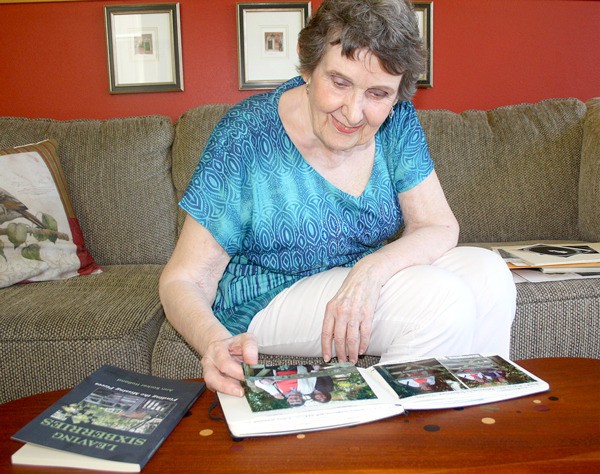Ann Barker Holland didn’t shed a tear as she stood on the deck of the Washington, preparing to embark on a voyage across the cold and vast Atlantic, sailing to America towards an uncertain future.
She didn’t cry, but her emotions were tumultuous, the sadness all-consuming.
Just hours prior, she had bid farewell to her home, her friends and her father.
It would be decades before she returned to Sixberries, her idyllic countryside family home outside of Sussex, England. She would never see her father again.
The day was July 7, 1940. Barker Holland was five years old.
Just in time for her eightieth birthday, Barker Holland, now an Oak Harbor resident, penned a memoir, entitled “Leaving Sixberries: Finding the Missing Pieces,” detailing her experiences.
Barker Holland was born in London, though her family later moved to the English countryside. Her mother was American-born, her father British.
She was four years old in September, 1939, when WWII began.
The tranquility of countryside life was short-lived; for 10 months, air raid sirens blared daily.
Barker Holland and her siblings crouched beneath a table which was propped against the front door, a makeshift air raid shelter.
At times, the floor shook with the force of the bombs.
Portsmouth, the home of the Royal Navy Port, was a prime target for German forces. It was not far from Sixberries, though Barker Holland said she had no real indication of just how close she and her family were to the target until years later.
“All the grownups I knew had worried looks on their faces,” she recalled, explaining that she was consumed with anxiety, though her mother tried her best to shelter the children from knowing the true breadth of danger.
Often, Barker Holland could hear adults talking as she listened attentively through doorways; but when she entered the room, the subject always changed.
Given the frequent bombings and palpable tension of those around her, however, Barker Holland had no doubt the country was at war.
The deciding factor that led Barker Holland, her three older siblings and mother to leave England was the battle at Dunkirk.
Thirty-thousand allied troops were pushed into the water by the Germans. Of the survivors, many returned home to their respective towns and villages and spread the word.
It was then, Barker Holland said, that many English citizens began to recognize the danger they, their families and countrymen were in.
She, her siblings and mother packed their trunks and prepared to set sail from Galway Bay on the west coast of Ireland. Men were not permitted to leave the country.
Leaving her home, and her father, was the most difficult experience of her life, Barker Holland recalled.
In the memoir, Barker Holland noted that, despite her tumultuous emotions, she did not allow her pain to show through visible tears. “For years, I have not been able to let myself cry,” she wrote.
“I know that millions of people were experiencing much worse things than what was happening to us.”
Writing the book opened a “flood-gate” of emotion, she said, and proved to be therapeutic.
“It has given me a sense of closure,” she said.
Though decades have passed, the pain has not altogether subsided; while writing, she shed tears freely.
Barker Holland and her siblings arrived safely at their destination on Vashon Island, where they quickly acclimated to American life.
“It was quite wonderful for us, just like heaven,” Barker Holland said, recalling the peacefulness of the island and the warmth of her easy-going American grandmother.
Barker Holland relocated to Whidbey 11 years ago. But Sixberries still holds a place in her heart. She has returned three times over the years.
Upon her most recent visit, she was ecstatic to see that the new owners had maintained the home, installing new gardens and making improvements and repairs where necessary.
A number of her watercolor and ink sketches depict Sixberries and the surrounding countryside she so loved as a child.
Barker Holland is the last survivor among her siblings, and noted that she felt a responsibility to preserve that era of family history for her children and theirs.
When her son remarked that she had “left a legacy,” Barker Holland knew she had accomplished her goal.
“Leaving Sixberries” is available for purchase at Lotus Tea Bar and Studio.



